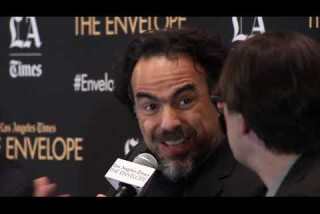Is awards season having a Donald Trump moment?
Like the presidential primary season, the Hollywood guild awards do not come as a perfect or predictable whole.
Each guild has its own quirks--its favorites, pet peeves and demographics--that help determine the winners. A triumph among actors, for instance, doesnât assure a win among directors, just as a victory in New Hampshire hardly locks down success in South Carolina.
Still, taken as a composite, certain patterns emerge. As a rule of physics, awards bodies do not tend to jut off completely in their own direction. Movies that win one of the major prizes have a higher probability of winning another. And at some point, as with primaryâ season, all that momentum tends to snowball and create an air of invincibility, which is how movies like âSlumdog Millionaire,â ââArgoâ and âThe Kingâs Speechâ each swept the three major guild awards and then went on to win the Oscar best picture in their respective years.
See more of Entertainmentâs top stories on Facebook >>
All of this is why the win for Alejandro G. Inarrituâs revenge-survival epic âThe Revenantâ on Saturday night at the Directors Guild Awards -- the last of the troika of prizes from major guilds that also includes producers and actors -- is so surprising. (The fourth such honor, from screenwriters, doesnât carry the same weight because the guildâs eligibility rules are more restrictive and exclude a number of top contenders.)
âThe Revenantâ had not won top honors from the other two major bodies, the Screen Actors Guild or Producers Guild of America -- those went to Tom McCarthyâs journalism-centric scandal pic âSpotlightâ and Adam McKayâs financial-crisis black comedy âThe Big Short,â respectively.
In fact, Inarritu was actually a question mark at the DGA. He had won the groupâs prize last year, for âBirdman,â which made some pundits think voters would tire of him and choose someone else. (Heâs the first director to win the DGA prize in consecutive years in the 65-plus-year history of the award.) So right off the bat the win is a little unexpected.
The Envelope Screening Series: âThe Revenantâ


'The Revenant': Attraction of the story

'The Revenant': Conditions affect performance

'The Revenant': Agility of the story

Video: 'The Revenant': Limited shooting hours

Video: 'The Revenant': The bear scene

Video: 'The Revenant': Know what you're getting into

'The Revenant': Knowing a character's future
But Saturday nightâs developments are even more surprising because, with âThe Revenantâ win, we now have a recent awards season anomaly. The Inarritu victory means that for the first time in 11 years, no movie that triumphed with one of the three major film guilds topped the list of another.
Yep, in each of the previous 10 years, a film has won the top prize from at least two of the three guilds (including that wacky 2013, when there was a PGA tie between âGravityâ and â12 Years a Slave;â âGravityâ also won the DGA) .
In five of the eight years before this one, a single movie actually won all three prizes. This includes last year, when âBirdmanâ swept the trio on its way to the best picture Oscar.
But that all went to seed this year.
The split we just witnessed signals what those of us in the punditry business, very officially, call âa wide-open race,â or less officially, a âwe donât really know whatâs going on so weâll just keep forecastingâ race.
Certainly there are specific dynamics to why that happened, and if youâre even a casual reader of awards-season commentaries, youâll know some of what they are. The three guilds consist of people with different temperaments, valuing different skills, and each of the three winners played to those preferences.
âSpotlightâ is the sort of robust ensemble piece that every actor dreams of being a part of, so the movie won SAGâs top prize. âThe Big Shortâ is the kind of tonally tricky effort that keeps a lot of plates spinning, so it attracted the affections of producers. And âThe Revenantâ features the kind of bold filmmaking â and, maybe even more important, the directorial self-sacrifice â that filmmakers tend to prize. So it won the DGA.
But that doesnât entirely explain the split. Contenders come with different strengths in many years. And yet we rarely see this kind of divergence.
At least, we rarely see this kind of divergence of late. Youâll notice that a lot of these patterns involve recent awards season history. The 10 years that preceded this one has indeed been a period of consensus and lock-step. But if you go back to the 10 years before that (the SAG awards were created in 1995, so this is essentially the beginning of contemporary guild-award history), something else was happening.
Oscars 2016: Full Coverage | Complete list | Snubs, surprises and reactions | Top nominee photos | Oscars are so white, again
In three of those years, we had the same divergence we had this year -- no movie managed to win more than one guild. Thatâs how it went down in the 2000 season (âGladiator,â âCrouching Tiger, Hidden Dragon,â and âTrafficâ split PGA, DGA and SAG); in 2001 (âMoulin Rouge!â âA Beautiful Mind,â and âGosford Parkâ); and in 2004 (âThe Aviator,â âMillion Dollar Babyâ and âSidewaysâ). No group could seem to agree with any other group.
Basically what it comes down to is that for the first 10 years of guild-award history the split happened three times. In the following 10 years it didnât happen at all. (If youâre curious and/or Inarrituâs publicist, youâll be interested to know that it was the DGA winner that went on to win best picture in two of the three previous split years.)
Which leads to an interesting theory. The past 10 years have been a time of increasing coverage of awards season. First that was true with the blogs and print special sections that began taking off in the 2000s and, later, with the social-media platforms that amplified their megaphone. It all turned awards prognosticating into a noisy, real-time (if still very much pseudo-scientific) enterprise. And more noise, as my colleague Charles McNulty has eloquently written, tends to drown out those voices arguing for outliers and passion choices.
Award season bodies are too small, and guild choices too entropic, for any of this to be empirical, let alone airtight. But certainly itâs a coincidence worth noting. Before awards coverage reached its modern fever pitch, awards groups would at least somewhat regularly go their own way. Since the decibel level was cranked up, itâs hardly happened at all.
So whatâs going on this year? The blog and social-media noise hasnât gone anywhere--in fact, itâs louder than ever. So is this just an exception to the trend? Or is it a sign of a kind of bristling, a hive-mind reaction against all the predictions and recommendations that so many people who donât vote for awards make to people who do?
Is it a momentary outlier? Or a restless response, as in our politics, to a handed-down status quo? That already seems to be afoot at the Oscars with âRoom,â an outside-the-system upstart that defeated three better-funded and more traditional contenders in three different categories, including the most establishment of establishment candidates, Ridley Scott.
Is this all just a blip, or something that signals a more deep-seated resistance to how awards season is supposed to go?
Thereâs no immediate answer to these questions. But theyâve become increasingly noteworthy ones to ask, just as they have with politics. Are the Donald Trumps and Bernie Sanders of the world -- and, indeed, the larger unpredictable group of candidates of which theyâre a part -- simply a function of a strange and anxious moment? Or a harbinger of a new reality, in which convention and consensus becomes a non-factor, even a hindrance?
Iâm not suggesting that some kind of grassroots uprising is happening in Hollywood. Awards season voters are still very much subject to what movies the studios send out and campaign for -- and, yes, for better or worse, what ink-stained wretches like myself and my colleagues say. Movies arenât politics, and all three of these guild winners are well-oiled, conventionally backed contenders (even if the more modestly budgeted âSpotlight,â coming from the smaller distributor Open Road, is a far more independent choice than its Big Studio rivals).
But at a cultural moment emphasizing the upstart and the outsider, one that almost seems to be reveling in a kind of electoral chaos, itâs fair to wonder if voters are also feeling that itch, wanting to hark back to a time when Oscar season wasnât a foregone conclusion. One academy member I spoke to recently said they were tired of being told by âall these punditsâ what they should do and think. A curmudegonely sentiment, to be sure, but not, I suspect, an uncommon one. (This feeling might also apply to how voters feel about the widespread coverage of the diversity debate, but thatâs another matter.)
One of the movies, âThe Big Short,â has an even more direct connection to the current political-revolution moment: Itâs become a favorite of Sanders, who said âdamn right I haveâ when asked if heâd seen it and called it an âexcellent film.â
Sadly for both our sanity and the collective good, neither the current awards season nor the presidential election cycle is near the finish line. The way voters have been wriggling around, we may yet see a few more surprises before all is said and done this year. And, perhaps, even beyond this year.
You Might Also Like:
For âThe Revenant,â the drama wasnât always on-screen
The Great Spoiler: Three major nominees stepped aside to make âRoomâ for this one
More to Read
Only good movies
Get the Indie Focus newsletter, Mark Olsen's weekly guide to the world of cinema.
You may occasionally receive promotional content from the Los Angeles Times.











